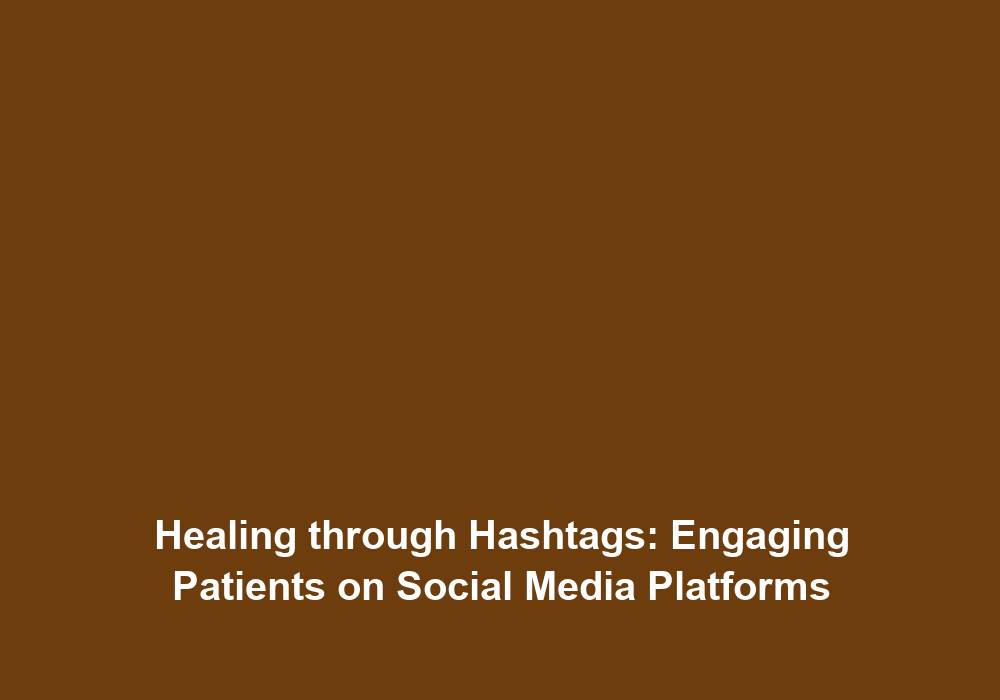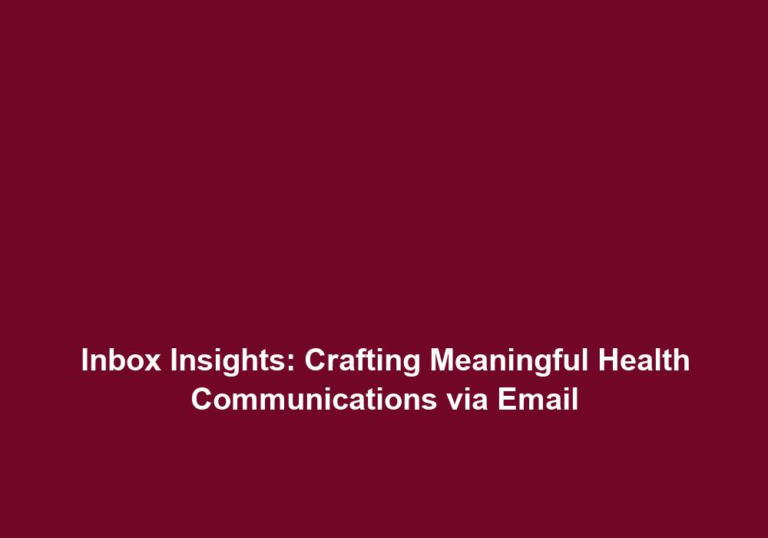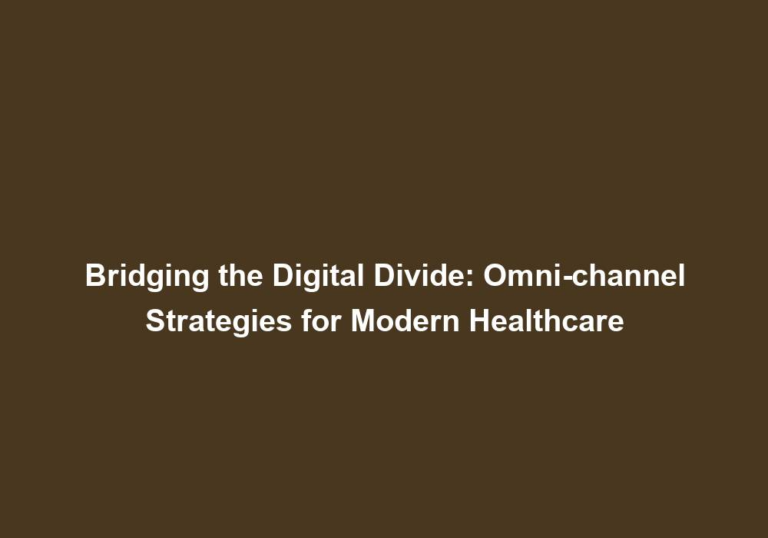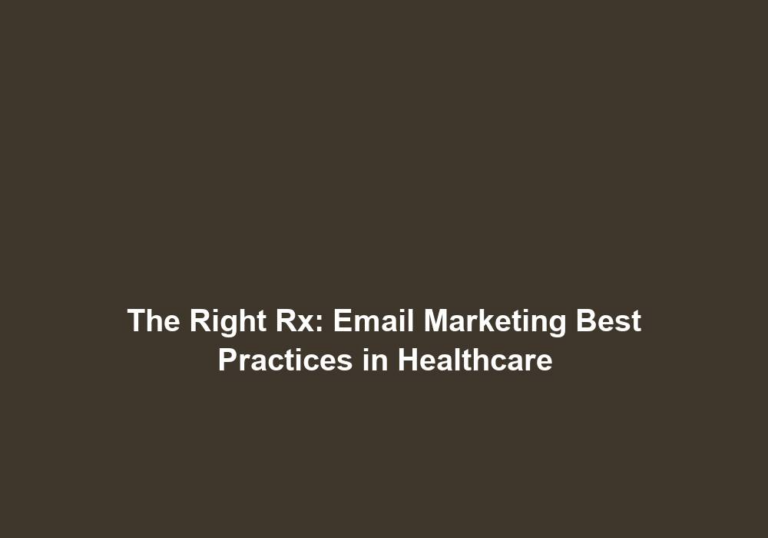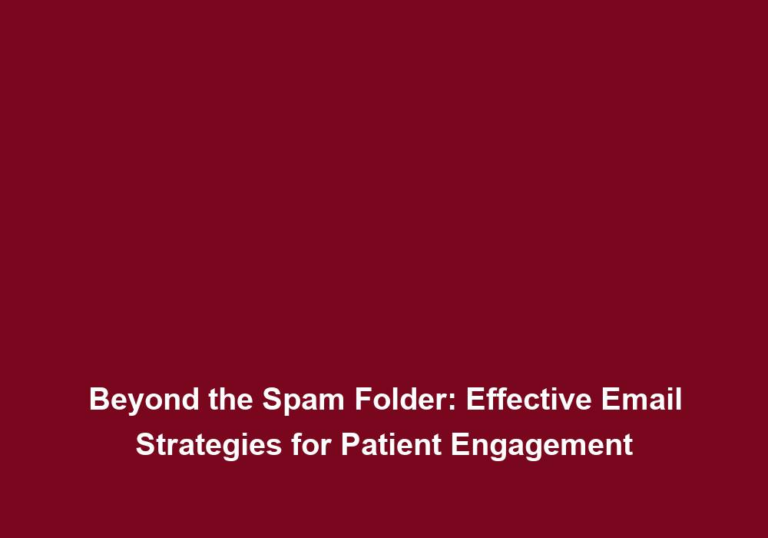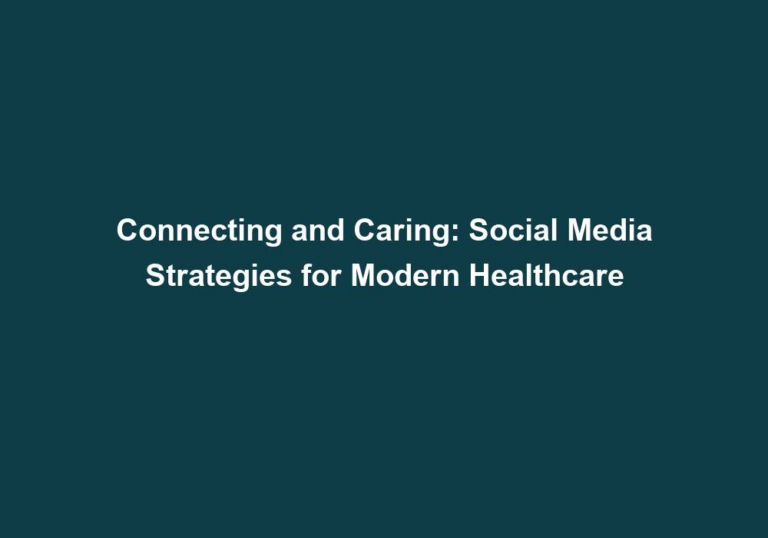Healing through Hashtags: Engaging Patients on Social Media Platforms
In today’s digital age, social media platforms have revolutionized the way we connect, communicate, and share information. From Twitter to Instagram, Facebook to LinkedIn, these platforms offer unique opportunities for individuals and organizations to engage with their audience, and this includes the healthcare industry. In recent years, healthcare providers and patients alike have recognized the potential of social media as a tool for healing and support. One strategy that has gained significant traction in this regard is the use of hashtags.
Understanding the Power of Hashtags
Hashtags are a way of categorizing content on social media platforms. By using the pound symbol (#) before a word or phrase, users can create a hyperlink that groups together posts and conversations related to that specific topic. Hashtags have become an integral part of the social media experience, allowing users to discover and engage with content that aligns with their interests. Utilizing hashtags can be an effective strategy to reach a broader audience and actively foster engagement.
Harnessing the Healing Potential
- Creating a Sense of Community: Hashtags provide a unique opportunity for patients, caregivers, and healthcare professionals to come together and form a virtual support network. By incorporating condition-specific hashtags, individuals facing similar health challenges can connect, share experiences, and provide emotional support to one another. This sense of community can be a source of healing, alleviating feelings of isolation and offering a platform to discuss treatment options, research breakthroughs, and coping strategies.
- Patients can find solace in joining communities that understand their specific health condition, providing them with a safe space to share their experiences and seek advice.
- Caregivers can connect with others who are going through similar challenges, offering support and guidance in their caregiving journey.
- Healthcare professionals can engage with patients and gain insights into their experiences, leading to improved patient care and treatment outcomes.
- Promoting Patient Advocacy and Education: Social media platforms empower patients and caregivers to become advocates for their own health and wellbeing. By utilizing condition-specific hashtags, patients can amplify their voices, raise awareness about their experiences, and advocate for improved treatment options or policy changes. Additionally, healthcare professionals can leverage hashtags to disseminate accurate and timely medical information, debunk myths, and educate the public about various health conditions.
- Patients can raise awareness about rare diseases or medical conditions that often go unnoticed, leading to increased support and research efforts.
- Caregivers can share their stories and challenges, highlighting the importance of support systems and resources for caregivers.
- Healthcare professionals can use hashtags to share evidence-based information, debunk medical misinformation, and promote health literacy among the public.
- Fostering Emotional Support: Battling a chronic illness or going through a medical procedure can be incredibly challenging, both physically and emotionally. Hashtags related to mental health, mindfulness, or emotional wellbeing can serve as a platform where individuals can share their struggles, seek advice, and find solace in the experiences of others. By engaging in conversations surrounding these hashtags, patients can find emotional support, learn coping mechanisms, and gain a sense of hope.
- Patients can share their personal stories of resilience and recovery, inspiring others who may be going through similar challenges.
- Mental health professionals can provide valuable insights, resources, and coping strategies to individuals seeking support.
- Supportive communities can provide a sense of belonging and understanding, reducing the stigma associated with mental health issues.
- Crowdsourcing Research and Treatment Options: Social media platforms have the potential to bridge the gap between patients, healthcare providers, and researchers. By using condition-specific hashtags, patients can contribute to research initiatives, share their experiences with specific treatments or medications, and provide valuable insights that may help shape future medical advancements. Furthermore, healthcare professionals and researchers can utilize hashtags to disseminate information about ongoing studies, clinical trials, and emerging treatment options, fostering a collaborative approach to healthcare.
- Patients can share their experiences with different treatment options, helping others make informed decisions about their own health.
- Researchers can gather data from a diverse patient population, leading to more comprehensive and accurate research outcomes.
- Healthcare providers can stay updated on the latest developments in their field and share relevant information with their patients.
- Encouraging Accountability and Compliance: Managing a chronic illness often requires adherence to a medication regimen, lifestyle changes, and ongoing medical appointments. By incorporating hashtags that encourage accountability and compliance, patients can track their progress, set goals, and share their achievements with a supportive community. This form of social accountability can be a powerful motivator, empowering individuals to take control of their health and providing a sense of accomplishment.
- Patients can set goals and share their progress, receiving support and encouragement from their online community.
- Healthcare professionals can provide guidance and resources to help patients stay committed to their treatment plans.
- Online communities can celebrate milestones and achievements, fostering a positive and supportive environment.
Best Practices for Hashtag Utilization
To harness the healing potential of hashtags effectively, it is crucial to follow some best practices:
- Research Relevant Hashtags: Before incorporating hashtags into your social media content, conduct thorough research to identify the most relevant and widely-used hashtags in your niche. This will help ensure that your content reaches the appropriate audience and maximizes engagement.
- Use tools like hashtag generators or social media analytics platforms to discover popular and trending hashtags in your industry.
- Consider the specific interests and demographics of your target audience to select hashtags that will resonate with them.
- Use a Mix of General and Specific Hashtags: While using general health-related hashtags can attract a wider audience, incorporating specific condition-related hashtags can help you connect with individuals who are more likely to engage and resonate with your content. Striking a balance between general and specific hashtags can yield the best results.
- Include broad health-related hashtags to reach a larger audience interested in general health and wellness.
- Incorporate condition-specific hashtags to target individuals who are actively seeking information and support related to their specific health condition.
- Engage in Conversations: Hashtags are not just a way to categorize content; they are an invitation to engage in conversations. Actively participate in discussions, respond to comments, and offer support to others. Authentic engagement fosters trust, builds a loyal community, and enhances the healing experience.
- Respond to comments and inquiries promptly, showing genuine interest in the concerns of your audience.
- Offer support, advice, and encouragement to individuals who are sharing their experiences and seeking guidance.
- Share valuable resources, articles, or studies related to the hashtag topic to contribute to the conversation.
- Be Mindful of Privacy Concerns: While social media platforms offer a wealth of opportunities for engagement, it is essential to be mindful of privacy concerns. Patients should carefully consider what personal information they choose to share publicly and ensure their privacy settings are appropriately configured.
- Avoid sharing sensitive personal information that could compromise your privacy or security.
- Review and adjust your privacy settings on social media platforms to control who can see your posts and engage with your content.
- Track and Analyze Metrics: To gauge the success of your hashtag utilization, track and analyze relevant metrics such as reach, engagement, and audience demographics. This data can help refine your social media strategy, identify content gaps, and optimize future hashtag usage.
- Use social media analytics tools to monitor the performance of your posts and hashtags.
- Identify patterns and trends in engagement metrics to understand what type of content resonates most with your audience.
- Adjust your hashtag strategy based on the insights gained from data analysis.
In conclusion, hashtags have the potential to transform social media platforms into powerful healing tools for patients and healthcare providers alike. By utilizing hashtags strategically, patients can find support, advocate for their health, access valuable information, and foster a sense of community. Healthcare organizations and professionals can leverage hashtags to educate, engage, and empower patients, ultimately enhancing the healing journey in the digital age.

